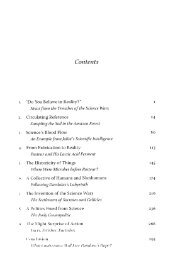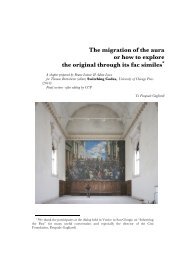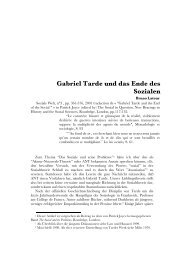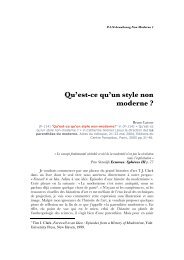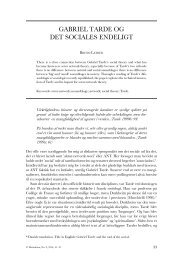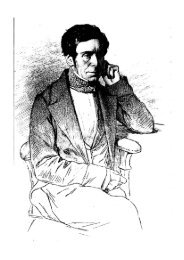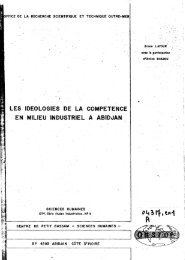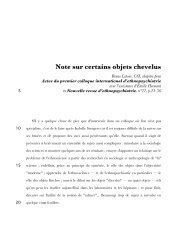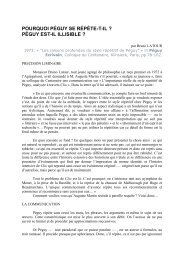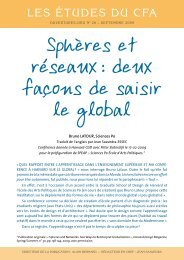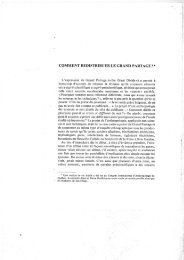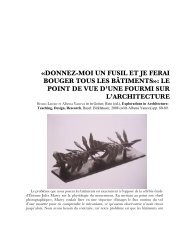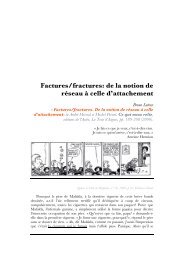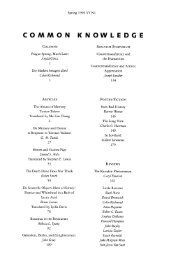Clothing the Naked Truth - Bruno Latour
Clothing the Naked Truth - Bruno Latour
Clothing the Naked Truth - Bruno Latour
Create successful ePaper yourself
Turn your PDF publications into a flip-book with our unique Google optimized e-Paper software.
Stories about Science<br />
This assumption lies behind rhe recenr emphasis on hands-orr<br />
experience for introducing phenomena and principles of <strong>the</strong> world<br />
and of science to children and adults in hands-on interactive science<br />
centres, such as Frank Oppenheimer's Exploratorium in San Francisco,<br />
and our Exploratory in England, in Bristol, as well as o<strong>the</strong>r<br />
hands-on science centres in America, Canada, India and many<br />
o<strong>the</strong>r countries. But, if active interaction is so important, can we<br />
gain new knowledge from such hands-offexperience as television ?<br />
This is an experimental question. It should be possible to find<br />
out, by <strong>the</strong> methods of experimenral psychology, just what people<br />
can learn from static or moving pictures and how much is added<br />
by interaction through active touch. Physics used ro be called,<br />
as it still is in Scotland, Experimental Philosophy. What we need<br />
is a broad-based experimental investigation of rruth. But just as<br />
physics cannot say what electrons are made of, and psychologists<br />
cannot say what mind is made of- indeed, rhese may be essentially<br />
meaningless questions - so, perhaps, we cennot ask at a deeper<br />
level what truth is. For it seems that we can only describe and<br />
explain relations. The trouble about asking for <strong>the</strong> 'substance' of<br />
metter, or mind, is that we are asking for more than relations,<br />
and so for more than we can discover by explorâtory behaviour<br />
or experiment, or games with or against nature.<br />
The trouble about truth is rhar rhe reladon or link between perceptions<br />
and propositions ro 'objective rrurh' is a bridge with ônly<br />
one visible pier. The orher end of <strong>the</strong> bridge, if <strong>the</strong>re is one, lies<br />
in a sea of mystery. This, surely, is something of what Newton<br />
meent when he described himself as like a boy playing on rhe<br />
beach, picking up especially beautiful pebbles from an infinity<br />
of wonders.<br />
roo<br />
<strong>Bruno</strong> <strong>Latour</strong><br />
CLOTHINGTHE NAKED<br />
TRUTF{<br />
2.4.8 A sentence does not hold toge<strong>the</strong>r because<br />
it is true, but because it holds toge<strong>the</strong>r we say it is<br />
'true'.<br />
But what does it hold on to ? Many things.<br />
Why ? Because it has tied its fate to anything at<br />
hand that is more solid than itself. As a result no<br />
one can shake it loose without shaking everything<br />
else.<br />
Nothing more, you <strong>the</strong> religious, nothing less,<br />
you <strong>the</strong> relativists.<br />
Q U A E S T I O I : I S S C I E N T I F I C T R U T H D I S M A N T L E D B Y<br />
T A K I N G R E A S O N A W À Y ?<br />
SrNcE scrENTrFrc rRUTH is based on a series ofrational procedures<br />
to sort out legitimate from illegitimate claims, no account of how<br />
science proceeds can do away with reason. Depriving oneself of<br />
notions like rationality, objectivity, scientific method, rules of<br />
logic, is voluntarily to choose dementia since it is abandoning<br />
<strong>the</strong> only touchstone we have left to discriminate dementia from<br />
normality.<br />
It is so difticult to do away with <strong>the</strong>se notions thât <strong>the</strong> very<br />
people who criticize science in <strong>the</strong> making, develop social studies<br />
of science and claim to be relativists are never<strong>the</strong>less scholars whose<br />
works are indistinguishable in practice and in form from those<br />
<strong>the</strong>y attack. They constantly imply that rational procedures are<br />
necessary to discriminate <strong>the</strong>ir truer claims from <strong>the</strong> wrong-headed<br />
I O I
Stories about Science<br />
ideas of <strong>the</strong>ir adversaries. In rationally denying <strong>the</strong> importance<br />
of reason, <strong>the</strong>y vindicate <strong>the</strong> claims of rationaiisti.<br />
The links thar were forged during <strong>the</strong> Enlightenment between<br />
<strong>the</strong> scientific research programme, <strong>the</strong> politiàal emancipation of<br />
<strong>the</strong> people and ethical responsibility are rà ,trorrg that it ii impossible<br />
to have one without rhe rwo orhers. Dismàntling rationaliry<br />
as <strong>the</strong> main foundation of science is in effect to advocate-reactiorrary<br />
politics and it leads to moral relativism. The Enlightenment comes<br />
in one package. To depreciate<br />
<strong>the</strong> importance ofieason is to advo-<br />
cate obscurantism.<br />
d" away<br />
Tq<br />
with rationality is impossible, selÊcontradictory<br />
and dangerous for democracy as well as for <strong>the</strong> mores.<br />
Sed contra<br />
To this I will answer that <strong>the</strong>re is a confusion being made among<br />
rationalists between cause and consequence. A stalement is true<br />
that resists all atremprs to bend it or to break it. on this everyone<br />
agrees. The disagreè-errt starts when we wanr co account for <strong>the</strong><br />
resistance of a stâtement to dispute and dissent. Depending on<br />
<strong>the</strong>ir denomination, rationalists claim that <strong>the</strong> main sou.ci of<br />
robustness comes from <strong>the</strong> presence ei<strong>the</strong>r of consistent logical<br />
rules, or of exact representation of an object out <strong>the</strong>re, or of an<br />
efficient action. The problem is thar, whèn a study of science in<br />
<strong>the</strong> making is carried out, <strong>the</strong>se three alternative sources of robustness<br />
appear along with many o<strong>the</strong>rs. Moreover <strong>the</strong> 'coherence'<br />
of a logical demonstration, <strong>the</strong> 'exactness' of a representation, or<br />
<strong>the</strong> 'efticiency' of all action are words used, aftir <strong>the</strong> staremenr<br />
has resisted trials. They are cheers after <strong>the</strong> ui.ro.y bur do not<br />
eccount for this victory itself. In order for <strong>the</strong>m to'be bellowed,<br />
hundreds of o<strong>the</strong>r allies have to be present at <strong>the</strong> same time, allies<br />
about whom and about which rationalisrs are srrangely silent. The<br />
study of all <strong>the</strong> allies which have to be recruiteJ and musrered<br />
for a statement to be held true, that is to resist all attempts at<br />
breaking or bending it, is feasible and necessary. Rationalisis just<br />
confuse cause and consequence, <strong>the</strong> cheers of <strong>the</strong> victor with <strong>the</strong><br />
army that made <strong>the</strong> victory possible. They confuse whar is held<br />
toge<strong>the</strong>r - that is truth - with what is holding <strong>the</strong> whole lot<br />
toge<strong>the</strong>r.<br />
'!<br />
<strong>Clothing</strong> tlu' Ntkcl 'l'ntlr<br />
Exemplunr<br />
Louis Pasteur is said to have defeated his opponcnr l)ouc hcrl<br />
because he demonstrated rationally and objectively that thc sponraneous<br />
generation advocated by Pouchet was at best an artifact,<br />
at worst a fraud. For <strong>the</strong> rationalists such a debate is now closed;<br />
<strong>the</strong> winners take all. Not only did Pasteur win, but he also won<br />
because he was <strong>the</strong> most rational of <strong>the</strong> two. There is an asymmetry<br />
between Pasteur and Pouchet in <strong>the</strong>ir use of reason and <strong>the</strong>ir access<br />
to truth, en asymmetry which is extended to <strong>the</strong> way <strong>the</strong> modern<br />
scholar treats <strong>the</strong> two: Pasteur is studied thoroughly and with<br />
respect, Pouchet lightly and with disdain.<br />
For a relativist scholar, reason and truth have to be put aside<br />
for a moment, so that a symmetry can be artificially recreated<br />
between two equally honest, equally rational, equally hard-working<br />
men. Once <strong>the</strong> scale has been calibrated, <strong>the</strong> debate is reopened<br />
and <strong>the</strong> allies on both sides of <strong>the</strong> scale are carefully weighed one<br />
after <strong>the</strong> o<strong>the</strong>r. A new asymmetry is going to be visible when<br />
<strong>the</strong> scale tips, but this asymmetry is not to come from <strong>the</strong> scholars'<br />
own handling of <strong>the</strong> affair, but from <strong>the</strong> weight of <strong>the</strong> allies Pasteur<br />
brings into <strong>the</strong> fray.<br />
Pasteur is a member of <strong>the</strong> Academy; his opponent is not. He<br />
can expound his own point of view at full length in <strong>the</strong> house<br />
journal; his opponent is allowed only an abstract. The<br />
Commission set up by <strong>the</strong> Academy to judge <strong>the</strong>ir two claims<br />
is made up only of Pasteur's colleagues and admirers; his<br />
opponent has no one on <strong>the</strong> commission sympa<strong>the</strong>tic to his<br />
claim. Pasteur invokes God, <strong>the</strong> support of <strong>the</strong> Church, Law<br />
and Order, on behalf of his demonstration that spontaneous<br />
generation cannot occur; his opponent is associated with<br />
a<strong>the</strong>ism, darwinism and social revolution. Pasteur treces a<br />
complete dichotomy between his religious or political opinions<br />
and his science; his opponent, chafting under <strong>the</strong> accusation<br />
of a<strong>the</strong>ism, mixes moral argument with his experimental set<br />
u p , e t c . . . .<br />
On <strong>the</strong> two sides of <strong>the</strong> balance allies are added: <strong>the</strong> Academy,<br />
God, <strong>the</strong> scientific method, etc. They all haue to be counted until<br />
<strong>the</strong> scale tips irreversibly. Not only <strong>the</strong> third one. Not only <strong>the</strong><br />
first one (see below, quaestio z). Which scholar most resembles<br />
ro2 ro3
Stories about Science<br />
<strong>the</strong> rationalist's portrait of <strong>the</strong> perfect objective scientist? [s it<br />
<strong>the</strong> one who decides from <strong>the</strong> beginning that <strong>the</strong>re is a complete<br />
asymmetry between <strong>the</strong> objective Pasteur and <strong>the</strong> irrationalist Pouchet?<br />
Or is it <strong>the</strong> one who, after calibrating <strong>the</strong> balance, lets <strong>the</strong><br />
scale tip under <strong>the</strong> weight of all <strong>the</strong> unexpected allies brought<br />
into <strong>the</strong> dispute ? The second one of course. Elut none<strong>the</strong>less it<br />
is <strong>the</strong> first who preaches lessons on scientific method, morality<br />
and rationality !<br />
Respondeo<br />
*The only way to study science in <strong>the</strong> making is to follow how<br />
heterogeneous sets of allies are tied toge<strong>the</strong>r, without ever using<br />
words like'rationality','objectivity','methodological rules' and<br />
such like. All <strong>the</strong>se terms might be useful in a controversy but<br />
<strong>the</strong>y do not describe <strong>the</strong> controversy. They might add some robustness<br />
to an emerging network, <strong>the</strong>y do not sum up <strong>the</strong> strength<br />
of this network. To <strong>the</strong> study of reason we prefer that of network,<br />
or, to say it in French, to raison we prefer <strong>the</strong> réseaux. Wc can<br />
tell rationalists what Laplace told Napoleon when he asked him<br />
what was God's place in his scheme: 'Sire, I do not need this<br />
hypo<strong>the</strong>sis.' To confuse rationality with science is like confusing<br />
<strong>the</strong> war cries with <strong>the</strong> actual moves and know-how of <strong>the</strong> karateka.<br />
To be sure, war cries play some role in intimidating <strong>the</strong> opponent,<br />
but it is not fitting for a scholar to be so easily impressed.<br />
*The accusation of selÊcontradiction falls by <strong>the</strong> wayside here<br />
too. All scholars, no matter if <strong>the</strong>y believe in rationality or not,<br />
do use <strong>the</strong> same stratagems and get by, mustering as many allies<br />
as <strong>the</strong>y can, in order somehow to streng<strong>the</strong>n <strong>the</strong>ir claims and<br />
make <strong>the</strong>m more robust so as to withstand trials. Depriving ourselves<br />
of rationality is not weakening our own discourse, since<br />
we claim, on <strong>the</strong> contrary, that <strong>the</strong>se allies have neuerbeen alone<br />
on <strong>the</strong> side of <strong>the</strong> strong claims. Instead of being selÊcontradictory<br />
as if we were requesting for ourselves a privileged access to truth<br />
that we would deny o<strong>the</strong>rs, we are simply self-exemplifying. Our<br />
own claims too gain in robustness if we tie <strong>the</strong>ir fate to o<strong>the</strong>r<br />
more solid claims until <strong>the</strong>y withstand trials so well that no one<br />
can bend or break <strong>the</strong>m.<br />
*The Enlightenment was conceived two centuries ago as a war<br />
machine against religion and <strong>the</strong> ancien régime. Science was sup-<br />
r04<br />
<strong>Clothing</strong> <strong>the</strong> <strong>Naked</strong> <strong>Truth</strong><br />
posed to clear up <strong>the</strong> dark ages of superstition and absolutism,<br />
and since ethics was left without a prop, rationality was employed<br />
to prop it up. Today, we are entangled in scientifico-political<br />
imbroglios that promise total (nuclear)illumination and total darkness<br />
at once. The beautiful metaphor of light against night has<br />
been so obscured that it is time, after two centuries of loyal service,<br />
to give up <strong>the</strong> 'Enlightenment'. lt is because we want to disentangle<br />
<strong>the</strong> scientifico-political imbroglios defining our new social links<br />
that we should abstain from <strong>the</strong> notions of 'reason' and 'truth'.<br />
Rationalists crown <strong>the</strong> victors by calling <strong>the</strong>m 'rational' and<br />
depreciate <strong>the</strong> losers by branding <strong>the</strong>m as 'irrational', and such<br />
behaviour is taken as <strong>the</strong> epitome of morality (see below, quaestio<br />
3)! On <strong>the</strong> contrary, using such labels has become unethical since<br />
<strong>the</strong>y are what hides lrom view <strong>the</strong> hundreds of heterogeneous<br />
allies that are contributing to <strong>the</strong> overall robustness of science<br />
and politics.<br />
To do away with rationalism is inevitable, selÊexemplifying<br />
and necessary in order to understand anew what democracy and<br />
ethics are.<br />
QUAESTTO 2: IS RArIo-Ï;""i: aE REPLACED BY soCIAL<br />
It is impossible not to use rationality - even though it is far from<br />
a good notion (see above, quaestio t) - because of <strong>the</strong> terrible consequences<br />
that its rejection would entail. By jeopardizing <strong>the</strong> three<br />
possible definitions of scientific truth (coherence, adequacy of representation<br />
to its object, e{ficacity) in order to account for <strong>the</strong><br />
robustness of our sciences, we are left with only one issue: <strong>the</strong><br />
weak social tics that make up our society will have to bear <strong>the</strong><br />
weight of all our certitudes. Physics will be explained not by <strong>the</strong><br />
structure of <strong>the</strong> world but by <strong>the</strong> organization ofa Science Research<br />
Council; astronomy will be accounted for not by <strong>the</strong> stars and<br />
<strong>the</strong> galaxies, but by <strong>the</strong> professional interests of Greenwich<br />
Observatory; <strong>the</strong> robustness of genetics will come not from what<br />
<strong>the</strong> chromosomes do, but from <strong>the</strong> consensus achieved by bourgeois<br />
biologists. The rich and robust repertoire of <strong>the</strong> natural sciences<br />
will be explained by <strong>the</strong> poor and weak repertoire of <strong>the</strong><br />
social sciences:we will get consensus instead of objectivity; social<br />
r o 5
Stories about Science<br />
interests instead of truth; society instead of <strong>the</strong> world. It is to<br />
avoid <strong>the</strong>se dire issues that rationality, as a stop-gap solution, is<br />
necessary. Without ir, we readily sink.<br />
. By doing ^way with rationaliry, no reality is left. Everything<br />
becomes. socially construced - tire Eiffel Tâwer, quarks, black<br />
holes, this table, my mo<strong>the</strong>r-in-law, oil reserves. . . . The solidity<br />
of reality is now replaced by dreams or social ties. It is not only<br />
science that is thrown away, it is common sense. Relativism<br />
replaces realism. Since everything is socially consrructed I could<br />
just as well throw myself into thà air from ih. top of <strong>the</strong> Empire<br />
state Building and 'negotiate' with gravity ! No, *e need to rerain<br />
some comnl.n sense and be able to thump on a table that solidly<br />
resists and proves itself not to be a dream or a social construction.<br />
tsy replacing<br />
^<br />
rationality with mere social factors everything<br />
fades away and becomes a plot of devious, inrerested Machiavellian<br />
Princes selling <strong>the</strong>ir ideas and grabbing for power. There is no<br />
longer any possibility ofdistingùshing bet-.à dream and reality,<br />
between archaic and modern thought, between witchcraft and science.<br />
Everything is equal. All <strong>the</strong> cows are equally grey. It is<br />
<strong>the</strong> very principle of all possible discriminations t'hrt i, ,ik.r,<br />
when rationality is thrown out.<br />
"*"y<br />
Sed rcntra<br />
To this I will answer that rhere is some misunderstanding on<br />
<strong>the</strong> definition of realism. Reality is what resisrs (res in Latrn). Let<br />
us call trial whatever tests this resistance. The àvourite gesrure<br />
of realists, thumping a table, is a trial of that sort. The table resrsts<br />
<strong>the</strong>ir fists. They are right in saying that it is solid and real. Never<strong>the</strong>less,<br />
it would be absurd to .ottilrde from this trial by fist that<br />
smashing <strong>the</strong> rable with a sledge-hammer will have <strong>the</strong> sa'me.esult.<br />
Ano<strong>the</strong>r trial will define ano<strong>the</strong>r relation and hence anorher reality.<br />
This is what relativisrs say. They cherish reality as much as anyone<br />
else, <strong>the</strong>y simply require us ro menrion <strong>the</strong> rp..ifi. trial that defines<br />
a specific resistance and hence a specific reality. ,Realities, is a<br />
ygtd defining a plural; it tells of a rilation, of a fiont of resisrance;<br />
it is not something that exists independently among o<strong>the</strong>r less<br />
real objects, for instance, representations, d.eams, imalination.<br />
<strong>the</strong> question<br />
.\*<br />
is ro decide rhe causes ofresistanceio a specific<br />
trial. Here it is easy ro clear up <strong>the</strong> mistakes made by both realisrs<br />
<strong>Clothing</strong> <strong>the</strong> <strong>Naked</strong> <strong>Truth</strong><br />
and social relativists. They both believe that <strong>the</strong> /isf of causes that<br />
cxplain <strong>the</strong> resistance can be made in aduance once and for all and<br />
that this list is by and large made of homogeneous entities. The<br />
first denomination believes that <strong>the</strong> main sources of resistance<br />
come from non-human elements; <strong>the</strong> second that <strong>the</strong> main sources<br />
come from human or social elements. The first are horrified when<br />
human elements invade <strong>the</strong> list: <strong>the</strong> second are as horrified when<br />
non-human elements get into <strong>the</strong> dispute. The first one screams:<br />
'This<br />
is social relativism!';<br />
'This<br />
<strong>the</strong> second screâms as loudly,<br />
is going back to naive empiricism !' However, nothing in <strong>the</strong> doctrines<br />
of realism and relativism makes such a homogeneous list<br />
necessary. On <strong>the</strong> contrery, any trial, including <strong>the</strong> fist and <strong>the</strong><br />
sledge-hammer ones, invokes and convokes human and nonhuman<br />
allies toge<strong>the</strong>r. And it is most often because of this mixing<br />
up and confusion (see below, quaestio S) that <strong>the</strong> realists and relativists<br />
withstand <strong>the</strong> pressure, thus defining reality. They are both<br />
right - <strong>the</strong> first in stressing non-human allies, <strong>the</strong> second human<br />
ones - but <strong>the</strong>y both have too narrow a defnition of reality.<br />
Exemplum<br />
There is nothing to stop us from adding allies, one after ano<strong>the</strong>r,<br />
on <strong>the</strong> scales on which Pasteur and Pouchet have now become<br />
commensurable. In <strong>the</strong> exemplum above (see quaestio r). I purposely<br />
limited <strong>the</strong> two lists to social elements (<strong>the</strong> Academy, God, publications,<br />
gate keepers, buddies). Is it enough to tip <strong>the</strong> balance?<br />
Maybe yes, maybe no, it all depends on <strong>the</strong> specific controversy.<br />
In many o<strong>the</strong>r cases calling someone a<strong>the</strong>ist in front of a commission<br />
in which he has no friend would have been enough to settle<br />
<strong>the</strong> debate. Here it is not enough because Pouchet is able to use<br />
Pasteur's own protocol and to display microbes doing all sorts<br />
of tricks; for instance, <strong>the</strong>y reproduce like devils even after he<br />
heated <strong>the</strong> flasks in which Pasteur said that nothing could appear<br />
any more because <strong>the</strong> milieu had been sterilized by heat. Why<br />
not add <strong>the</strong> microbes to <strong>the</strong> list of allies Pouchet enlists ? What<br />
stops us ? lVho said that <strong>the</strong> Academy commission or God were<br />
always enough, and for ever would be, to win over a colleague ?<br />
If <strong>the</strong> controversy heats up a bit many o<strong>the</strong>r elements have to<br />
be brought into <strong>the</strong> fray. Pasteur has now to bring his own<br />
microbes into <strong>the</strong> dispute to counterbalance his opponent's flasks.<br />
ro6 107
Pouchet's allies Pasteur's allics<br />
a lot of <strong>the</strong>nr<br />
Asymmetric treatment: a dichotomy is made<br />
in <strong>the</strong> list of allies<br />
Figure r.<br />
Storics about Sciutce<br />
a l o t o f t h c n r<br />
human allies<br />
n o n - h u m a n a l l i e s<br />
dirhotomy<br />
He has to modify his experimental protocol and, for insrance,<br />
to increase <strong>the</strong> heat.<br />
It would be unfair to be realist for pouchet (he has nor got<br />
<strong>the</strong> microbes in his camp) and relativist for pasteur (he has gor<br />
all his buddies well mobilized on his behalf). It would be as ,rnfair<br />
(quaestio r, exemplum) to be relativist for pouchet (he has a lot<br />
of ideological and social interesrs to defend) and realist for pasteur<br />
(of course he won, he was right after all and had <strong>the</strong> microbes<br />
for him). The only possible fair rrearmenr is to see how each of<br />
<strong>the</strong>m makes <strong>the</strong> list of human and non-human allies longer in order<br />
to resist <strong>the</strong> settlement of <strong>the</strong> controversy to <strong>the</strong>ir adversary's benefit.<br />
There is no reason to impose any comparrmenr or any dicho-<br />
,g*y among,<strong>the</strong> types of allies mobilized in <strong>the</strong> controveisy since<br />
<strong>the</strong> actors make no such compartment and mix <strong>the</strong>m at will. Even<br />
<strong>the</strong> very distinction between human and non-human elemenrs<br />
slowly fades away to be replaced by a gradient of hybrids arrayed<br />
in tiers.<br />
Respondeo<br />
*It is wrong to believe thar we are faced with only two branches<br />
of this terrible alternative: ei<strong>the</strong>r rationalism or social relativism.<br />
+<br />
i<br />
{<br />
j<br />
I<br />
<strong>Clothing</strong> <strong>the</strong> <strong>Naked</strong> <strong>Truth</strong><br />
P o u c h e t ' s a l l i e s Pasteur's allics<br />
no suPPorrer<br />
accused of a<strong>the</strong>ism<br />
provincial<br />
abstracts only<br />
protocols<br />
ill equipped<br />
ferments after<br />
sterilization<br />
etc.<br />
supporters<br />
Academy<br />
in Paris<br />
full articles<br />
good protocols<br />
- - - . - - - - , - - - -<br />
w c l l c q u r p p c d<br />
no ferments after<br />
more heat<br />
etc.<br />
human<br />
Symmetric rreâtmenr: all <strong>the</strong> allies are listed, no matter how<br />
long and heterogeneous<br />
<strong>the</strong> list<br />
Figure z.<br />
No dirhotony<br />
non-human<br />
We do not have to choose between <strong>the</strong>se two equally impoverished<br />
versions of reality: <strong>the</strong> object out <strong>the</strong>re, <strong>the</strong> social in here. To<br />
deny <strong>the</strong> Scylla of rationalism is not to be thrown on to <strong>the</strong> Charybdis<br />
of sociologism. We do not hâve to trade black holes for consensus,<br />
particle physics for professional interests, or biology for<br />
Research Councils' petty politics. Such an alternative would mean<br />
that <strong>the</strong> list of allies one should mobilize to withstand a trial is<br />
determined in advance and has to be made ei<strong>the</strong>r of human or<br />
of non-human elements. It would especially mean that we know<br />
in advance what society is made of and what nature is made of.<br />
It is <strong>the</strong> refreshing aspect of scientific controversies to play havoc<br />
with any definition of both, by unexpectedly tying microbes with<br />
gods, heat with Academies, and flasks with commission reports.<br />
Rationality is not a solution - not even a stop-gâp solution - to<br />
untangle <strong>the</strong>se imbroglios brought about by scientists engaged<br />
in heated controversies. Far from being what saves us from shipwreck,<br />
rationality rocks <strong>the</strong> boat by forcing us to <strong>the</strong> most absurd<br />
choice - nature or society - as if <strong>the</strong>re were a possible a priori<br />
distinction between <strong>the</strong> two. Having to choose between realism<br />
and social relativism is like having to choose who is <strong>the</strong> most<br />
reactionary and <strong>the</strong> most despotic between <strong>the</strong> Shah-in-Shah or<br />
ro8 r09
Stories about Science<br />
Khomeini - a hard task indeed.<br />
*Who cherishes reality most? Those who try to explain it by<br />
depriving <strong>the</strong> things to be tried out of half of rheir resources and<br />
allies, or those who let <strong>the</strong> things have on <strong>the</strong>ir side as many<br />
heterogeneous allies as <strong>the</strong>y see fit ? Who offers <strong>the</strong> fairest and<br />
most realistic account of Pasteur's victory and of Pouchet's defeat ?<br />
Those who make a dichotomy between nature and society- Figure<br />
r in <strong>the</strong> exemplum above - or those who do not even understand<br />
<strong>the</strong> meaning of such a divide - Figure z? Are we going to be<br />
crucified until <strong>the</strong> Last Judgement between rhe Object and <strong>the</strong><br />
Subject, one being <strong>the</strong> exclusive property of realist scientists and<br />
<strong>the</strong> o<strong>the</strong>r being <strong>the</strong> exclusive property of social relativists ? In<br />
this divide and crucifixion, it is reality that suffers most, because<br />
<strong>the</strong> trials of resistance are made up of nei<strong>the</strong>r neture nor society.<br />
The only people who take reality seriously are those who let <strong>the</strong><br />
actors plait for <strong>the</strong>mselves weaker and softer ties as in a macramé.<br />
Even <strong>the</strong> decisive realists' acts - thumping a table and pointing<br />
<strong>the</strong>ir fingers - are studied more precisely by us than by <strong>the</strong>m,<br />
because we add to <strong>the</strong> table <strong>the</strong> long network that has made <strong>the</strong><br />
world inscribed on its surface. And if someone claims that it is<br />
Newton's law of gravity alone that threw dozens of businessmen<br />
from Wall Street skyscrapers on Black Thursday, let him go<br />
straight to his retirement home. No ! Reality is taken seriously<br />
only once <strong>the</strong> twin bro<strong>the</strong>rs of realism and social relativism are<br />
put to rest. Fasolt and Faft-ner are guarding <strong>the</strong> only treasure worth<br />
finding: <strong>the</strong> world.<br />
*Far from being <strong>the</strong> only touchsrone allowing us to distinguish<br />
between truth and falsity, witchcraft and science, pseudo-science<br />
and science, myths and reality, rationality is what makes incommensurable<br />
all <strong>the</strong>se activities, thus rendering <strong>the</strong> causes of <strong>the</strong>ir<br />
distinctions opaque. Rationality is Brennus's word thrown on to<br />
<strong>the</strong> scale; 'uae victis'<br />
i 'you, <strong>the</strong> losers, you will also be irrational';<br />
'whoever does not have, even what he has will be taken away<br />
from him' (Mark 4:zil.The only way to render Pouchet and Pasteur<br />
commensurable and <strong>the</strong>n to register why at one point <strong>the</strong><br />
balance tips on Pasteur's behalf - see below , quaestio 3 - is first<br />
to do away with rationality, with objectivity, with scientific<br />
method or to suppose that <strong>the</strong> two colleagues are both equally<br />
well endowed with <strong>the</strong>m. The only way ro derect <strong>the</strong> practical<br />
asymmetries<br />
among beliefs is to treat <strong>the</strong>m with complete symmetry.<br />
<strong>Clothing</strong> <strong>the</strong> <strong>Naked</strong> <strong>Truth</strong><br />
The notions of rationality, like that of truth or objectivity, muddle<br />
<strong>the</strong> issues. They add obscurity to obscurity. On <strong>the</strong> contrary, it<br />
is complete relativity that makes all <strong>the</strong> trials of resistance commensurable.<br />
QUAESTI) 3: IF rRUrH;:?iiilrLED ARE wE LED ro<br />
Rationality is indispensable - even though it is fraught with difficulties<br />
(quaestio I and z) - because it is <strong>the</strong> only way of maintaining<br />
any distinction between might and right. Without it, <strong>the</strong> powerful<br />
are also made right, force and reason are equal, <strong>the</strong>re is no ground<br />
left to dissent, no court of appeal to dispute authority and we<br />
are led back to obscurantism and despotism.<br />
The adversaries of rationality may be easily defeated. If <strong>the</strong>y<br />
were right <strong>the</strong> winner in scientific disputes would be <strong>the</strong> one who<br />
has <strong>the</strong> strongest muscles, or <strong>the</strong> best political connections or <strong>the</strong><br />
biggest armoured tanks. Since it is almost never <strong>the</strong> case, this<br />
means that <strong>the</strong>re is something else that tips <strong>the</strong> balance in <strong>the</strong>ir<br />
favour. It is this 'something else', this unforced consensus, that<br />
we call rationality and objectivity. To take this 'something else'<br />
away is to abandon any hope of ever understanding why a controversy<br />
is settled and consensus eventually achieved.<br />
Rationality is what allows us to distinguish politics or business<br />
from science. If we give it away, <strong>the</strong>n <strong>the</strong>re is no reason to resist<br />
political influences contaminating <strong>the</strong> results of <strong>the</strong> sciences and<br />
imposing <strong>the</strong>ir definition of what <strong>the</strong> world should be like. Every<br />
objective scientific result will be censored and bent to please elected<br />
representatives, businessmen or bureaucrets. It is <strong>the</strong> end of <strong>the</strong><br />
only pure and free realm left in <strong>the</strong> fabric of our societies.<br />
But <strong>the</strong> worst consequence of irrationalism is that any group<br />
endowed with enough resources will be able to impose <strong>the</strong>ir truth<br />
over everyone else's, and <strong>the</strong> public, deprived of <strong>the</strong> notion of<br />
reason, will be made defenceless. If Nazis come to power, <strong>the</strong>n<br />
Jewish science' will be forbidden everywhere, relativism and irrationalism<br />
will be defied. If enough people ga<strong>the</strong>r toge<strong>the</strong>r to deny<br />
that <strong>the</strong> Holocaust took place, will that mean that <strong>the</strong> Holocaust<br />
didnot take place? It is to this horrible conclusion that those who<br />
deny rationality are inevitably led. They begin by weakening <strong>the</strong><br />
I I O I I I
Stories about Science<br />
objectivity of gravity and black holes, and <strong>the</strong>y end up weakening<br />
<strong>the</strong> objectivity of evil itself. Dismantling scientific trurh in any<br />
small way leads to immorality in a large way.<br />
Sed contra<br />
To this I will answer that <strong>the</strong>re is a misunderstanding over <strong>the</strong><br />
notion of force. 'Force' looks very different when it is considered<br />
in oppositior? to reason, and when it is seen as what designates<br />
<strong>the</strong> complete gradient of resistance where reality is tested (see above,<br />
quaestio z). 'Pure force' is an expression that takes meaning only<br />
because<br />
'argumentation',<br />
it is<br />
'rationality',<br />
opposed to<br />
'objectivity',<br />
'rational discussion' and so on. It is devoid of any meaning<br />
once this contrast is removed and when a gradient of forces is<br />
allowed to settle. When such is <strong>the</strong> case, erguments also have<br />
some force; logical connections are not without strength ei<strong>the</strong>r;<br />
legal barriers exert some pressure as well; taboos seem to have<br />
quite a lot of clout also. When <strong>the</strong> two extremes - pure might and<br />
pure right - are forgotten, all <strong>the</strong> relations of forces may start<br />
to unfold. Thus, in order to study <strong>the</strong> way reality is built through<br />
trials of resistance, it is necessaty not to make any a, priori distinction<br />
between might and right.lf such an argument seems too reminiscent<br />
of some warlike philosophies of <strong>the</strong> pasr, simply substitute <strong>the</strong><br />
word 'weakness' for <strong>the</strong> word 'force'. Trials of weaknesses. shows<br />
of weakness, that's how reality is shaped. Rationalists seem to<br />
ignore that material resistance is better obtained by disseminâring<br />
<strong>the</strong> pressures than by concentrating <strong>the</strong>m on one point: ifit existed,<br />
<strong>the</strong> rationality <strong>the</strong>y invoke to bear <strong>the</strong> weight of<strong>the</strong> whole scientific<br />
construction would burst, as Atlas would do had he really to carry<br />
<strong>the</strong> world on his shoulders.<br />
Exemplum<br />
How do we account for Pasteur's victory ? Shall we say that he<br />
is <strong>the</strong> one who speaks <strong>the</strong> loudest ? Or that he is <strong>the</strong> tallest ? Or<br />
that he has <strong>the</strong> best showmanship ? Or that he is <strong>the</strong> toughest<br />
salesman ? Maybe yes, maybe no. As any student of war and politics<br />
knows <strong>the</strong>re is no sure recipe for success. The only general<br />
rule is that you should have more allies, more resources, that<br />
<strong>the</strong>y should be mobilizable, well positioned and have good morale.<br />
r t 2<br />
<strong>Clothing</strong> <strong>the</strong> <strong>Naked</strong> <strong>Truth</strong><br />
Apart from this, victory depends on <strong>the</strong> specifrc situation. Pasteur<br />
indeed makes striking experiments; he uses <strong>the</strong> energy of <strong>the</strong><br />
microbes to make <strong>the</strong>m do all sorts of games in front of his<br />
audience: at will <strong>the</strong>y infect flasks or respect <strong>the</strong> pure sterile<br />
medium, become visible or invisible, appear or disappear. Is <strong>the</strong><br />
force of his demonstration different in bind from <strong>the</strong> force of hts<br />
argumentation ? And are <strong>the</strong>se two different from <strong>the</strong> forces<br />
arrayed by <strong>the</strong> Academy, or by <strong>the</strong> invocation of God's name?<br />
No. It is <strong>the</strong>ir coming toge<strong>the</strong>r and <strong>the</strong>ir being invoked toge<strong>the</strong>r<br />
that eventually tips <strong>the</strong> balance on Pasteur's behalf, at least for<br />
a while. Pouchet gives up, his microbes have deserted him. Is<br />
it insane to sây that he has been'forced'to give up? The force<br />
of evidence, <strong>the</strong> force of truth, <strong>the</strong> force of demonstration are<br />
plaited from many different coloured threads. Nothing is made<br />
clearer by pretending that a demonstration is not strong lil
Stories about Science<br />
that shows <strong>the</strong> absurdity of <strong>the</strong> belief in <strong>the</strong> importance of reason.<br />
She is really trying to limit <strong>the</strong> production of science to its bare<br />
bones; that is pure rationality. No one had done it before and<br />
this is why rationalists had <strong>the</strong> field to rhemselves. They claimed<br />
that pure, free, objective science was everything, but money and<br />
resources were flowing in through <strong>the</strong> back door. Now, <strong>the</strong> money<br />
is cut. Rationality is left alone to supporr <strong>the</strong> scientific enrerprise.<br />
What will be left ? 'Everything' say <strong>the</strong> mystics of science.<br />
'Nothing'<br />
say <strong>the</strong> sociologists of science like myself. Devious political<br />
interests do not bend <strong>the</strong> straighr path of reason. They give<br />
science its flesh and its soul. It is not I who mixes up <strong>the</strong> Empress,<br />
God, <strong>the</strong> Academy, swan-neck flasks and bacteria in order to prove<br />
that spontaneous generation does not exist. It is Pasteur himself.<br />
It is he who consta,ntly translates politicel interests into microbe<br />
cultures and vice versa. Rationalists impute to <strong>the</strong> analyst's own<br />
devious mind what <strong>the</strong> scientists do. No doubt, this unfair rreatment<br />
is ano<strong>the</strong>r proof of <strong>the</strong>ir high sense of morality. The pure<br />
science untainted by political and indusrrial interests will be exactly<br />
what Mrs Thatcher means it to be: nothing. Is this what rationalists<br />
want ?<br />
*Since Plato, <strong>the</strong> touchstone of morality has been <strong>the</strong> distinction<br />
between might arrd right. Never<strong>the</strong>less, this distinction should<br />
be abandoned for morality to be effective again. '<strong>Truth</strong>' is what<br />
is held toge<strong>the</strong>r, not what holds toge<strong>the</strong>r (see above, quaestio t).<br />
To confuse <strong>the</strong> cause with <strong>the</strong> effect is to overlook <strong>the</strong> masses<br />
of resources that have constantly to be brought in and mobilized<br />
in order for an account to resist. To believe that truth can 'defend<br />
itself' or 'will eventually triumph' is to deprive it of <strong>the</strong> only<br />
allies that can make one eccount stronger than <strong>the</strong> o<strong>the</strong>rs. If <strong>the</strong><br />
account '<strong>the</strong> Holocaust took place' is in danger of being dismantled,<br />
who will defend it best ? Those who thump on <strong>the</strong>ir table<br />
and endlessly repeat that since it has really taken place it cannot<br />
be rationally denied by anyone in his right mind? Or those who<br />
will look for which resources to bring in, which powers to convoke,<br />
maybe which society to rebuild in order for this statement<br />
to remain indisputable for a bit longer ? There is no way to expect<br />
that a terrible statement millions of people would like to dissolve<br />
away will require /ess resources and /ess work in order to be maintained<br />
in existence, than a small statement about black holes or<br />
pions that interests twelve people in <strong>the</strong> whole world and means<br />
ï<br />
$ T<br />
<strong>Clothing</strong> <strong>the</strong> <strong>Naked</strong> <strong>Truth</strong><br />
nothing to billions of o<strong>the</strong>rs. Scientists are ready to build a billion<br />
pounds' worth of accelerators to answer <strong>the</strong> latter point and not<br />
a penny for <strong>the</strong> former, which is supposed to glow on its own<br />
black light. It is because we have studied <strong>the</strong> resources that are<br />
necessary to believe minor points in <strong>the</strong> natural sciences that we<br />
are so concerned by <strong>the</strong> lack of resources to believe major issues<br />
in <strong>the</strong> historical sciences or in politics. We had to dissolve <strong>the</strong><br />
distinction between might and right so that <strong>the</strong> work of those<br />
who hold on to a belief be made manifest. You cannot have truth<br />
on one side and <strong>the</strong> mixed crowd of allies on ano<strong>the</strong>r. To believe<br />
that you can is to dismantle truth for good. Is this what rationalists<br />
really want in <strong>the</strong> depth of <strong>the</strong>ir hearts ? Longing for <strong>the</strong> naked<br />
truth is like longing for <strong>the</strong> purely spiritual: <strong>the</strong>y are both dangerously<br />
close to nothingness. I prefer truth warmly clo<strong>the</strong>d, incarnated<br />
and strong.<br />
Q U A E S T I O 4 : H A V E T H I N G S E X I S T E D B E F O R E B E I N G S O C I A L L Y<br />
C O N S T R U C T T O ?<br />
No matter how subtle <strong>the</strong>y try to be, relativists are unable to<br />
escape this absurd consequence of classic idealism: scientific facts<br />
did not exist before being 'socially constructed'. How silly! Were<br />
<strong>the</strong>re no electrons before Millikan? No microbes before Pasteur?<br />
And before Newton's day, was <strong>the</strong>re no gravity acting on stones,<br />
plenets, apples and stars ? Relativists have no way of escaping <strong>the</strong>ir<br />
ra<strong>the</strong>r crude version of <strong>the</strong> story of <strong>the</strong> tree falling in <strong>the</strong> forest<br />
unheard by anyone.<br />
Conversely, relativists can be led to accept <strong>the</strong> existence of<br />
everything which has been 'socially deconstructed'. They will have<br />
to say that angels and witches really existed in <strong>the</strong> middle ages,<br />
since people believed in <strong>the</strong>m, that flying saucers are really flying<br />
for those who accept <strong>the</strong>m; and that organisms really sprouted<br />
spontaneously, at least until Pasteur disproved Pouchet and his<br />
fellow travellers.<br />
What is absurd for <strong>the</strong> pasl existence or inexistence of facts is<br />
still more absurd for <strong>the</strong>ir present existence or inexistence. Relativists<br />
are forced to say that gravity exists only 'locally' in <strong>the</strong> laboratory,<br />
as if it were not acting on stones, planets, apples and stars<br />
well outside <strong>the</strong> laboratory; and, conversely, <strong>the</strong>y are forced to<br />
r r 4 I I 5
Stories about Science<br />
say that witchcraft also exists 'locally', in <strong>the</strong> countryside, as if<br />
it could be true irr onc place and false in ano<strong>the</strong>r!<br />
Witchcs r:ray dcpcnd on <strong>the</strong> spirit of a period but not gravity.<br />
Anyway, what should render relativists eternally silent is <strong>the</strong> wellknown<br />
mismatch between what some scientists or artists have<br />
done and <strong>the</strong>ir time. Many people have been totally unknown<br />
in <strong>the</strong>ir own country and culture, and only meny years later, even<br />
after <strong>the</strong>ir death, have turned out to be right, respected and credited.<br />
So, any attempt ro relare <strong>the</strong> right ideas of scientists with<br />
<strong>the</strong>ir time and milieu is at best a hopeless task, at worst a cheat.<br />
Sed contra<br />
To this I will answer that <strong>the</strong>re is a slight confusion being made<br />
here between existence and essence, a slight excess in going from<br />
one to <strong>the</strong> o<strong>the</strong>r, an excess I wish to avoid. We should be very<br />
careful in using verbs in <strong>the</strong> past tense. Are we allowed to conclude<br />
from <strong>the</strong> fact that something 'existed' between t, and t, that it<br />
has neuer existed ? Are we to conclude from <strong>the</strong> fact that something<br />
lras existed since t,, that it has always existed, even at t, ? The same<br />
care needs to be taken as far as space is concerned. From <strong>the</strong> fact<br />
that something exists only in between settings s" and 56, âre we immediately<br />
permitted to deduce that it exists nowhere else? Conversely,<br />
that something exists in between settings s, and s6, does this mean<br />
that we are allowed to say that it thus exists everywhere, even in<br />
settings s., sn ? The specification of times and settings reveals <strong>the</strong> temporal<br />
and local existenre of things, that is ro say, <strong>the</strong>ir history. Erasing<br />
times and settings defines <strong>the</strong> essence of things, that is <strong>the</strong>ir lack of<br />
historicity. The transformation of existences into essences, of history<br />
into anhistoricity, is made by jumping without warrant beyond<br />
networks of relations: if angels are deconstructed now, it is taken<br />
as a proof that <strong>the</strong>y were always invalid; on <strong>the</strong> orher hand, ifelectrons<br />
are constructed, it is taken as a proof that <strong>the</strong>y were always out<br />
<strong>the</strong>re; if witchcraft is still believed in in only a few places, ir is immediately<br />
taken as a proof that it should really exist nowhere; and if<br />
gravity is demonstrated to exist in a few laboratories, it is concluded<br />
that it should be everywhere, even where <strong>the</strong>re is no laborarory ro<br />
show it. In each of <strong>the</strong> four situations a supplement of weakness or<br />
of power is added ro rhe nerworks. I claim that we can live better<br />
without this supplement.<br />
<strong>Clothing</strong> <strong>the</strong> <strong>Naked</strong> <strong>Truth</strong><br />
Such an excess is not only unjust (see abovc, qua(stio 3) arrd unw;trranted,<br />
it also has <strong>the</strong> unhappy effect of distinguishirrg bctwccrr thc<br />
history of things that wax and wane and <strong>the</strong> anhistoricity ol'things<br />
that know not flux and change. In practice, this mear)s thlt thcrc<br />
can be history only of this sublunar world, our base world of humarr<br />
beliefs and opinions, but that <strong>the</strong>re can be no history of <strong>the</strong> supralunar<br />
world, <strong>the</strong> world of things that have always and everywhere been<br />
patiently awaiting discovery.<br />
'Worse,<br />
<strong>the</strong> very distinction between a human society and a nonhuman<br />
nature comes from this transformation of existences into<br />
essences: what could have hidden electrons for so long, when <strong>the</strong>y<br />
were <strong>the</strong>re all along? What could have made people believe in angels<br />
for so long, when really <strong>the</strong>re were never any angels at all ? What<br />
could make people disbelieve gravity, even when it is demonstrated<br />
in laboratories ? What could still make people believe in witchcraft<br />
in a few faraway places, when it exists nowhere? Answer: society.<br />
It is society that is made <strong>the</strong> source of all <strong>the</strong> biases and distortions<br />
that make people believe in things that do not exist and delay <strong>the</strong><br />
discovery of those which do exist. Society is in large part <strong>the</strong> artifcial<br />
solution found to account for all <strong>the</strong> delays and distortions due to<br />
<strong>the</strong> artifcial addition of essences to <strong>the</strong> networks. Take away essences<br />
and you will discover this refreshingly new breathing space: a society<br />
made only of human and social relations is no longer needed; conversely,<br />
things too have <strong>the</strong>ir history which is more than occasionally<br />
tied to our own.<br />
Exemplum<br />
Let us first treat <strong>the</strong> Pasteur-Pouchet debate as <strong>the</strong> rationalists<br />
'never', 'always',<br />
would like us to do. For this we add <strong>the</strong> adverbs<br />
'nowhere', 'everywhere'<br />
to <strong>the</strong> complex networks described in<br />
<strong>the</strong> former exempla. Pouchet believed for too long in a spontaneous<br />
generation that had never been <strong>the</strong>re. Pasteur, on <strong>the</strong> o<strong>the</strong>r hand,<br />
finally discovered, around 186o, <strong>the</strong> ferments carried by air that<br />
had always pestered humanity - corrupting <strong>the</strong>ir food and <strong>the</strong>ir<br />
best-planned experiments everywhere. To account for Fouchet's<br />
stubbornness, for Pasteur's discovery and for <strong>the</strong> belated recognition<br />
of micro-organisms, we simply employ <strong>the</strong> convenient social<br />
factors that society generously affords - cultures, traditions, establishment,<br />
classes, prejudices - you name <strong>the</strong>m. In a such classic,<br />
r 1 6 r 1 7
Stories about Science<br />
reasonable, plausible and stale account, one rhing is lost: history,<br />
and in particular <strong>the</strong> history of microbes.<br />
Let us now drain offthis excess of adverbs, so typical of rationalists'<br />
accounts, from <strong>the</strong> Pasteur-pouchet debate. -whrt<br />
is left are<br />
temporal and local shifting networks of relations among acrors<br />
(or 'actants' as <strong>the</strong>y are pedantically known), defined Ëy what<br />
<strong>the</strong>y do and what o<strong>the</strong>rs do to <strong>the</strong>m.<br />
Pouchet accuses Pasteur of desrroying <strong>the</strong> nature of <strong>the</strong> forces<br />
able spontaneously to recreate life becauie of <strong>the</strong> heat he employs<br />
in sterilizing his culture medium and of <strong>the</strong> air he excludes. This<br />
is a strong objection that Pasteur has to meet head on if he wanrs<br />
to convince his audience. In a famous experiment, he devises a<br />
flask with- a long swan neck and he leavès <strong>the</strong> top of <strong>the</strong> neck<br />
open so that air can still get i.. In spite of this, iiquids which<br />
have been sterilized remain clean. However, when hË breaks <strong>the</strong><br />
necks <strong>the</strong> liquids get dirty after a few hours and, after a few davs.<br />
<strong>the</strong>y are as full of micro-organisms as pouchet would have<br />
expected. The only modification has been <strong>the</strong> breakins of<strong>the</strong> neck.<br />
The air, Pasteur concludes, was able to sneak throrleh <strong>the</strong> neck<br />
and reach <strong>the</strong> liquid, but <strong>the</strong> slightly heavier micro"-organisms<br />
got trapped in one of <strong>the</strong> two curves and could not reach <strong>the</strong><br />
liquid in which <strong>the</strong>y thrive so well.<br />
without Pouchet's challenge, pasteur would not have needed<br />
to devise this elegant experiment. Thus pouchet constitutes part<br />
of <strong>the</strong> swan-neck flask, he is tied to it, he is part of it. If pasteur<br />
had not wanted to convince his audience thai all contaminations<br />
of cultures in <strong>the</strong> new emerging microbiology were due to external<br />
ferments sneaking in because of carelessn.ii, h. would not have<br />
needed to search for swan necks ei<strong>the</strong>r. His audience and tne new<br />
profession are also co-producers of <strong>the</strong> flasks, <strong>the</strong>y are tied to<br />
<strong>the</strong>m, <strong>the</strong>y are part of <strong>the</strong>m. But what about <strong>the</strong> fermerrts ? In<br />
how many o<strong>the</strong>r situations during <strong>the</strong> entire course of history<br />
has air been purified that way and, because of <strong>the</strong> trial imposeâ<br />
by <strong>the</strong> swan neck, been sorted out into micro-organisms on <strong>the</strong><br />
one hand and pure air on <strong>the</strong> o<strong>the</strong>r ? None. This is what rationalists<br />
and social relarivists always fail to see. The swan-neck experiment<br />
is new for Pouchet, for Pasreur, for <strong>the</strong> profession of miôrobiolo-<br />
gists, but also for <strong>the</strong> microbe.s, end, yes, Jor <strong>the</strong> air as well. you<br />
can't imagine ferments independently of <strong>the</strong> swan-neck flasks,<br />
any more than you can imagine Pasteur's cereer, or pouchet's<br />
r r 8<br />
Figure j.<br />
Addition of inexistence<br />
' . . . t h e n , t h e y h a v e<br />
never existed'<br />
<strong>Clothing</strong> <strong>the</strong> <strong>Naked</strong> <strong>Truth</strong><br />
TIME<br />
'angels<br />
no longer |<br />
'electrons<br />
now<br />
e x i s t . . . ' I e x i s t . . . '<br />
NETWORKS<br />
'witchcrafi 'gravity<br />
exists |<br />
is proven<br />
o n l y l o c a l l y . . . ' I l o c a l l y . . . '<br />
Addition of existence<br />
fate without <strong>the</strong>m, because <strong>the</strong> shape of all <strong>the</strong> protagonists -<br />
human and non-human - is being modified by <strong>the</strong> flasks as much<br />
as <strong>the</strong> flasks are being modified by all <strong>the</strong> o<strong>the</strong>r ectors. This is<br />
why things have a history. This has nothing to do with idealism;<br />
it is not because we impose our human categories to a ferment<br />
out <strong>the</strong>re, it is because <strong>the</strong> ferment in <strong>the</strong> swan-neck flask expcriment<br />
is a new ferment, defined in part, like any o<strong>the</strong>r actor, by<br />
all <strong>the</strong> o<strong>the</strong>rs whose fates are tied to it, including ourselves. The<br />
air itself is not <strong>the</strong> same air before and after Pasteur, and Pasteur<br />
is not <strong>the</strong> same after this sorting out of air. Nor is French society.<br />
This is why you should not bungle <strong>the</strong> analysis of networks by<br />
drowning <strong>the</strong>m with adverbs such as 'never', and 'nowhere',<br />
'always'<br />
and'everywhere'.<br />
Respondeo<br />
' . . . t h e n , t h e y h a v e<br />
always existed'<br />
' . . . t h e n i t e x i s t s<br />
everywhere'<br />
*Trees fall in <strong>the</strong> forest, but those elected to fall in <strong>the</strong> presence<br />
of men are not exactly <strong>the</strong> same, since one more element is added<br />
to <strong>the</strong>m - <strong>the</strong> eye or, more probably, <strong>the</strong> saw. Newton happens<br />
to gravity, and is an event that modifies it as much as <strong>the</strong>y both<br />
modify England and physics. Is this idealism? How would one<br />
define an electron before Millikan ? Ei<strong>the</strong>r you use <strong>the</strong> definition<br />
I I 9<br />
S<br />
P<br />
A<br />
C<br />
E
.Strrrics abttut Science<br />
tlr.rt Mrllrk.ur l{:rvc and retrospectively suppose that it was <strong>the</strong>re<br />
,rll .rlrrrrq bcfore, even without laboratories, cloud chambers,<br />
Arucricarr physics and Millikan - which is impossible - or you<br />
rcrnain silent - which is a much better tack than accusing relativists<br />
of absurdity. No one would ask where Caesar was before Rome<br />
or where <strong>the</strong> Nrg/rr Watch was before Rembrandt. Please simply<br />
consider that <strong>the</strong> history of non-humen acors is on a par with<br />
that of humans. I[ you find this parity hard to âccept remember<br />
that it is only your (or Plato's) very urge retrospectively to grant<br />
non-humans an enrpirc of cssc:nces that creates <strong>the</strong> very dichotomy<br />
bctwccn what has rnd what does not have history.<br />
*l)oor Srnith, in Orwell's tg84, was forced to cut and paste<br />
tlrc orrly isstrc of Tfu Times that was used as record of <strong>the</strong> past.<br />
Evcry ncw cvcnt was rewritten in a way that made it as if it<br />
had always existed; and every figure who had been purged away<br />
was writtcn offas far back in <strong>the</strong> pest as was necessary. As usual,<br />
rationalists adrnire in science what <strong>the</strong>y hate in politics. If Russian<br />
historians claim that <strong>the</strong>re had never been any Trotsky and that<br />
he had never been <strong>the</strong> head of <strong>the</strong> Red Army, rationalists are<br />
incensed by this tinkering with history; but if someone asserts<br />
that electrons have always been <strong>the</strong>re even before Millikan tied<br />
his fate to <strong>the</strong>irs, or that spontaneous generation had never been<br />
<strong>the</strong>re after all, <strong>the</strong>y swallow those lies hook, line and sinker. In<br />
each case, however, it is <strong>the</strong> very sâme argument, <strong>the</strong> same retrospective<br />
tampering with historical records, <strong>the</strong> same denegarion<br />
of what has and has not been. What happens later in <strong>the</strong> course<br />
of history should never be strong enough to eliminate what has<br />
been. You may if you wish act like <strong>the</strong> pharaohs who erased <strong>the</strong><br />
names of <strong>the</strong>ir predecessors and put <strong>the</strong>ir own in <strong>the</strong>ir place, but<br />
do not accuse as of immorality.<br />
*You are allowed to believe that gravity exists everywhere ourside<br />
<strong>the</strong> laboratories that demonstrate its presence. This is a constitutional<br />
right. But suppose you wânt to prove its action here. What<br />
will you be forced to do ? To build a lab, or to bring instruments<br />
âere. Now, who are <strong>the</strong> most scientifically sound? Those who<br />
say <strong>the</strong>t <strong>the</strong> conditions of <strong>the</strong> proof should always be specified,<br />
or those who like to believe in things <strong>the</strong>y cannot prove ? The<br />
local character of an existence cannot be used ei<strong>the</strong>r by excess or<br />
by default, ei<strong>the</strong>r to expand it everywhere at no cost, or to deny<br />
r20<br />
r<br />
Clorhing <strong>the</strong> <strong>Naked</strong> <strong>Truth</strong><br />
that it exists at all. Gravity and flying saucers circulate in tiny<br />
networks that rarely intersect one ano<strong>the</strong>r. Instead of jumping<br />
to unwarranted conclusions about total existence or total inexistence,<br />
we prefer to count <strong>the</strong> nodes of those networks, to see<br />
what <strong>the</strong>y tie toge<strong>the</strong>r and to study how <strong>the</strong>y measure up to one<br />
ano<strong>the</strong>r. Where is <strong>the</strong> absurdity ?<br />
*The idea of a society surrounding works, deeds and facts that<br />
would sometimes be in accordance with it and sometimes escape<br />
it comes from <strong>the</strong> sanle retrospective tinkering with local and<br />
temporal networks. Social influence is supposed to be an homogeneous<br />
atmosphere that surrounds every deed equally at a given<br />
time. It should come as no surprisc that lots of events appear<br />
to escape such an absurd dcfinition of society. tsut this is no proof<br />
that <strong>the</strong>y get free from history. They simply escape <strong>the</strong> crude<br />
definition that some sociologists and historians provide of a zeitgeist.<br />
lf a scientist dies unknown, if his manuscripts are passed<br />
along for several generations, if ano<strong>the</strong>r scientist later on uses <strong>the</strong>m<br />
for developing his <strong>the</strong>ories and, by chance, gives crcdit to thc<br />
poor fellow who is made <strong>the</strong> author of a <strong>the</strong>ory hc rrever held,<br />
ifpeople launch a subscription for building a statue to <strong>the</strong> unknown<br />
scientist, if texbooks are rewritten to make room for <strong>the</strong> ncw<br />
old forerunner, I fail to see in what possible way all <strong>the</strong>sc events<br />
could be out of normal history. When some events :lre said to<br />
escape society and <strong>the</strong> spirit of a period, filst rework thc definition<br />
of that socicty and that period, and only <strong>the</strong>n reach for your euns<br />
to silence relativists.<br />
Q U A E S T I O 5 : C A N \ v E L I V E W I T H O U T A D I V I D E B E T W E E N<br />
H U M A N S A N D N O N - H U M A N S ?<br />
The absurdity of social relativists lies in <strong>the</strong>ir denial of <strong>the</strong> importance<br />
of material constraints. Not everything is equally possible.<br />
Despite <strong>the</strong> wishes of people or society, tut-rtfpornts exist at which<br />
sheer technical limits render certain avenues possible or impossible,<br />
quite indeper-rdently of our desires. An account of technical and<br />
scientific progress that does not pay fulljustice to <strong>the</strong>se constraints<br />
may amuse and sometimes enlighten but, in <strong>the</strong> end, it is simply<br />
wrong. The knowledge of technologists should be added to that
Stories about Science<br />
of sociologists if we want to get a full picture.<br />
The solution offered by relativists (see above, quaestio z) leads<br />
to ano<strong>the</strong>r extravaganza. They want to treat all actors on a par.<br />
In order to avoid <strong>the</strong> absurd consequences of social relativism,<br />
<strong>the</strong>y want us to reach a much odder conclusion: people, animal<br />
and things are all mixed up in <strong>the</strong> same huge melting-por. By<br />
erasing all boundaries between human and non-humans, we would<br />
be led to claim that scallops think, bicycles argue, microbes fight,<br />
computers have volition, trees suffer under <strong>the</strong> saw, baboons build<br />
social <strong>the</strong>ories . . . Under <strong>the</strong> guise of such a naive anthropomorphism<br />
is hidden a crude and reactionary form of animism or of<br />
futurism. A qualitative distinction between human and nonhuman<br />
is mandatory in order to avoid treating men and women<br />
like animals or robots. Relativists want us to weaken <strong>the</strong> already<br />
frail dykes that keep barbarians at bay.<br />
Even if we could accept <strong>the</strong> moral sequels of mixing up human<br />
and non-human, relativists cannot avoid <strong>the</strong> technical difficulty<br />
that only humans talk. Our ability to speak is enough to maintain<br />
an absolute gap between us and things. Whenever whales,<br />
microbes, stars, scallops or electrons are said to speak, it is always<br />
through a human intermediary who grants or denies <strong>the</strong>m words.<br />
Relativists talk a lot about <strong>the</strong> speech-acts of non-humans - if<br />
<strong>the</strong>y were coherent, should that not be enough to silence <strong>the</strong>m ?<br />
Sed contra<br />
To this I will answer that, although coherent, I have no reâson<br />
to remain silent. The very opposition between rationalists and<br />
social relativists has already destroyed <strong>the</strong> absolute divide between<br />
human and non-human beyond repair. In order to explain <strong>the</strong><br />
settling of human controversies, rationalists or technologists must<br />
posit an outside non-human essence whose constraints are enough<br />
to impose, in <strong>the</strong> end, a consensus. To this, social relativists answer<br />
that <strong>the</strong> consensus is reached by humans, and only through social<br />
means, since <strong>the</strong>re is no outside essence which is constraining<br />
enough to silence us. The two positions are both mirror images<br />
of each o<strong>the</strong>r. The more rationalists insist on <strong>the</strong> constraints emanating<br />
from things, <strong>the</strong> easier it is for social relativists to demonstrate<br />
that things are not determinate enough to do that job. The<br />
more sociologists insist on <strong>the</strong> social means to reach consensus,<br />
1 ) )<br />
$ 1<br />
I<br />
I<br />
c<br />
i II<br />
What is<br />
asserted in<br />
<strong>the</strong>ory<br />
What is<br />
done in<br />
practice<br />
<strong>Clothing</strong> <strong>the</strong> <strong>Naked</strong> <strong>Truth</strong><br />
Rationalists or<br />
technologists<br />
/-\<br />
(<br />
ruEv ASSERTTHAT<br />
) thcre lre non-hunrans<br />
\-,/ out <strong>the</strong>re<br />
[)( nur'rN PRAC-nCE<br />
( i\ ) rHËY SPEAK<br />
)< -X FOR THEM<br />
Social relativists<br />
THEY ASSERT THAT K-X<br />
o N L Y H U M ^ N s ( X )<br />
mrkc r diffcrcncc K-X<br />
BUT tN PRACTIcE /---\<br />
THEY LET non-humans(<br />
sneak in \_-/<br />
Sum llî:;i"ï,î:.0'Tiï'* - iiiiË::.ii:**<br />
negated reasserted<br />
Figure 4.<br />
<strong>the</strong> easier it is for rationalists and technologists to demonstrate<br />
that something has been left aside: things and <strong>the</strong>ir constraints.<br />
The fur<strong>the</strong>r one side is pushed, <strong>the</strong> fur<strong>the</strong>r <strong>the</strong> o<strong>the</strong>r goes (see<br />
above, quaestio z). I call this a child's swing. It is fun, but not<br />
very suitable for grown-ups.<br />
Steps toward a more intriguing game may be taken if we compare<br />
what <strong>the</strong> twins claim to do with what <strong>the</strong>y do in practice.<br />
Rationalists or technologists are quick to mark a cut-off point,<br />
after which <strong>the</strong>y invoke <strong>the</strong> eminent rights of things in <strong>the</strong>mselves;<br />
in practice, however, <strong>the</strong>y are still quicker to push things aside<br />
while fiercely arguing on <strong>the</strong>ir behall thus <strong>the</strong>mselves entirely<br />
occupying <strong>the</strong> scene. Conversely, social relativists delight in denying<br />
any importance to outside constraints. However, in practice,<br />
<strong>the</strong>y demarcate ano<strong>the</strong>r cut-off point, and <strong>the</strong>n let things sneak<br />
in through <strong>the</strong> back door whenever <strong>the</strong>y wish to settle a dispute<br />
for good. This is very embarrassing for both schools because if<br />
we sum <strong>the</strong> four quadrants, <strong>the</strong> two groups end up equal (see<br />
Figure a). They play <strong>the</strong> same garr'e, but in a mirror. One group<br />
invokes non-humans while denying <strong>the</strong>m a role; <strong>the</strong> o<strong>the</strong>r invokes<br />
humans while denying <strong>the</strong>m a role.<br />
What is wrong in this too predictable game that always ends<br />
r2'l'<br />
)
Stories about Science<br />
up at <strong>the</strong> same point ? The respective roles granted to things and<br />
to humans. If we modify <strong>the</strong> attribution of roles <strong>the</strong> whole game<br />
oPens up.<br />
Since, in practice, no one is able to deny for good <strong>the</strong> presence<br />
of non-humans in achieving consensus (rationalism), or to make<br />
<strong>the</strong>m play <strong>the</strong> part of a final arbiter that setles disputes for good<br />
(social relativism), why not modify <strong>the</strong> scenario once and for all?<br />
Non-humans are party to all our disputes, but instead of being<br />
those closed, frozen and estranged things-in-<strong>the</strong>mselves whose<br />
part has been ei<strong>the</strong>r exaggerated or downplayed, <strong>the</strong>y are actors<br />
like all o<strong>the</strong>rs - open or closed, active or passive, wild or domesticated,<br />
far or close, depending on <strong>the</strong>ir (and our) negoriaring<br />
strength. When <strong>the</strong>y enter <strong>the</strong> scene <strong>the</strong>y are endowed with all<br />
<strong>the</strong> non-human powers that rationalists like <strong>the</strong>m to have, plus<br />
<strong>the</strong> warmth and uncertainty that social relativists recognize in<br />
humans.<br />
Since, in practice, no one is able to make humans play <strong>the</strong> part<br />
of a final arbiter which can settle disputes for good, or to deny<br />
for good <strong>the</strong>ir importance in achieving consensus, why not modify<br />
<strong>the</strong> scenario once and for all ? Instead of acting like those social<br />
animals whose part has been minimized or exaggerated, humans<br />
are spokespersons - who talk, represent and interpret non-humans.<br />
\Vhen <strong>the</strong>y do enter <strong>the</strong> scene, <strong>the</strong>y are granted all <strong>the</strong> powers<br />
of discussion, speech and negotiarion sociologists like <strong>the</strong>m to<br />
have, but in addition <strong>the</strong>y endorse <strong>the</strong> fate of all <strong>the</strong> non-humans<br />
for whom rationalists and technologists are so concerned.<br />
Relativists do not enjoy being swung back and forth from'social<br />
factors' to 'technical factors'. They have jumped out of <strong>the</strong> swing<br />
and rewritten <strong>the</strong> libretto so that <strong>the</strong>y will no longer be faced<br />
with <strong>the</strong>se silly twin characrers: <strong>the</strong> social animal on tÉe one hand,<br />
<strong>the</strong> thing on <strong>the</strong> o<strong>the</strong>r.<br />
Respondeo<br />
*The argument about 'constraints' is right only as long as one<br />
believes, first, that <strong>the</strong>re could be, on <strong>the</strong> one hand, someone<br />
- or something - free and, on <strong>the</strong> o<strong>the</strong>r, limits imposed on this<br />
freedom from <strong>the</strong> outside, and, second, only if <strong>the</strong>re existed<br />
between <strong>the</strong> two entities a cut-off point at which freedom would<br />
<strong>Clothing</strong> <strong>the</strong> Nakt'd'l'rutlr<br />
give way to necessity. A free, infinitely pliable human bcing coulcl<br />
<strong>the</strong>n be 'limited by' material constraints, or - depending on<br />
whe<strong>the</strong>r one is a rationalist or a social relativist - an infinitely<br />
interpretable thing could be 'limited by' social constraints. However,<br />
once you rewrite <strong>the</strong> scripts and put human and non-human<br />
on a par, <strong>the</strong> whole debate about constraints and cut-off points<br />
disappears because <strong>the</strong>re is no longer any place for a free, flexible<br />
or infinitely pliable character. We are all for hardness and robustness<br />
(see above, quaestio z), but <strong>the</strong> hard reality does not arise<br />
abruptly at some given point. So, instead of identifying cut-off<br />
points, let us spread <strong>the</strong> sources of hardness all along <strong>the</strong> networks,<br />
and instead of constraints let us talk only of resources. Gravity<br />
is not a 'constraint over' bridge designers' freedom. It is one of<br />
<strong>the</strong>ir many resources.<br />
*'Who mixes up <strong>the</strong> fate of humans and non-humans ? Those<br />
hundreds of thousands who bring microbes to bear on our lives,<br />
atoms to heat our houses, electrons to carry our voices, fossilized<br />
skulls which modify our genealogies, radio-waves which disseminate<br />
our President's speeches? Or, we, <strong>the</strong> dozens of social scientists<br />
who try to reconstruct how <strong>the</strong> former render <strong>the</strong> boundaries<br />
between human and non-human more meaningless every day ?<br />
Who is building <strong>the</strong> huge melting-pot where humans, animals,<br />
natural things and artifacts exchange properties ? We or those we<br />
try to follow? Who is extravagant? Those who breed hybrids?<br />
Or those who are trying to rework all of social science, so that<br />
we might understand how hybrids can so easily be created in spite<br />
of <strong>the</strong> 'strict boundary' between human and non-human ? What<br />
is <strong>the</strong> more barbarian ? To define a politics that considers all spokespersons<br />
equally - no matter if <strong>the</strong>y represent a human or nonhuman<br />
constituency - or to cling to version of politics that does<br />
not include <strong>the</strong> politics of things ?<br />
*lt is easy to trace an absolute gap, between humans who speak<br />
and non-humans who are mute, only if we do not think about<br />
<strong>the</strong> matter for more than ten seconds. At <strong>the</strong> eleventh, matter<br />
starts to become much less clear. First, lots of humans are talked<br />
aboutby o<strong>the</strong>rs -journalists, politicians, social scientists, to name<br />
just a few - but you rarely hear <strong>the</strong>ir voices directly. Second,<br />
most non-humans are said to communicate. write and answer<br />
directly in laboratories or through instruments. Microbes, electrons,<br />
gravity do <strong>the</strong> talking and <strong>the</strong> writing, not Pasteur, Millikan<br />
r24 r25
Stories about Science<br />
or Newton - indeed this is <strong>the</strong> very reâson why rnost realists<br />
and many rationalists cannot swallowrelativists' ,rg,r..,.rrrr; <strong>the</strong>y<br />
are <strong>the</strong> ones who most need to blur <strong>the</strong> absoltite distinction<br />
between who is speechless and who is nor. Third, who is speaking<br />
when sp-okespersons speak ? The representatives, or <strong>the</strong>ir ctnstitu-<br />
ency? If <strong>the</strong>y are faithful, 9h9v will simply be <strong>the</strong> mouthpiece<br />
of <strong>the</strong>ir constituency - as Hobtes would ,"y, th.y are only <strong>the</strong><br />
actors of whom <strong>the</strong> authors are <strong>the</strong> mulritudei. So, it is only when<br />
<strong>the</strong> spokespersons are unfaithful that a distinction may be made<br />
between those who are speechress<br />
and <strong>the</strong>ir reprer.rri.ii,r.r. I'<br />
<strong>the</strong> absence of a controversy over representation it is impossible<br />
to tell aparr those who speak directlyor those who speak inâirectly.<br />
But when a controversy flares up, <strong>the</strong> main argument of th. ,"p_<br />
resentatives is to say that <strong>the</strong>y 'simply carry oit' what <strong>the</strong> o<strong>the</strong>rs<br />
say, or.wish-go say . . . See ? You cannot silence <strong>the</strong> spokespersons,<br />
ei<strong>the</strong>r.by telling <strong>the</strong>m that <strong>the</strong>y are <strong>the</strong> only o.r.i *hJ talk or<br />
by telling <strong>the</strong>m that <strong>the</strong>y are simply talking in <strong>the</strong> name of o<strong>the</strong>r<br />
speechless creatures. Language is a faculty *ho* exact distribution<br />
is <strong>the</strong> uery outcome of our fiercest struggles. This is *hy *. cannot<br />
grant it all to humans withour rendèring <strong>the</strong> politics of things<br />
forever obscure.<br />
rz6<br />
STORIES ABOUT<br />
REPRESENTATION
Dismantling<br />
TRUTI{<br />
REALITY IN THE<br />
POST-MODERN V/ORLD<br />
Edited by<br />
Hilary Lawson<br />
and Lisa APPignanesi<br />
Based on a series ofpapers prescntcd at a<br />
conferencc at <strong>the</strong> tca and related materials<br />
Weidenfeld and Nicolson<br />
London
The paper 'Science as Solidarity' has appeared entitled 'Dismantling <strong>the</strong><br />
<strong>Truth</strong>: Objectivity and Science' in Nelson et al (eds) The Rhetoric of<br />
<strong>the</strong> Human Sciences: Language and Argument in Scholarship and Public<br />
Afairs (Madison, The University of V/isconsin Press), and is printed<br />
here by kind permission of <strong>the</strong> publisher.<br />
'Stories<br />
about Stories' and all introductory material @ Hilary Lawson<br />
'science<br />
as Solidarity'@ The ùIIT.rr,r, of V/isconsin press r987<br />
'Rationality,<br />
<strong>Truth</strong> and <strong>the</strong> New Fuzzies' @ W.H. Newton-Smith r989<br />
'After<br />
<strong>Truth</strong>: Post-Modernism and <strong>the</strong> Rhetoric of Science'@ Hugh<br />
Tomlinson r989<br />
'Realism<br />
in <strong>the</strong> Social Sciences'@ David Ruben r989<br />
'The<br />
Meaning of Experiment'O H.M.Collins r989<br />
'Touching<br />
<strong>Truth</strong>' @ Richard L. Gregory r989<br />
'<strong>Clothing</strong><br />
<strong>the</strong> <strong>Naked</strong> <strong>Truth</strong>'@ <strong>Bruno</strong> <strong>Latour</strong> 1989<br />
'The<br />
ldeology of Representation and <strong>the</strong> Role of <strong>the</strong> Agent'@ Steve<br />
Woolgar r989<br />
'Lying<br />
on <strong>the</strong> Couch'@John Forrester r989<br />
First published in Great Britain in r989 by<br />
George Weidenfeld & Nicolson Ltd<br />
9r Clapham High Street, London sw4 7rA<br />
All rights reserved. No part of this publication<br />
may be reproduced, stored in a retrieval system,<br />
or transmitted in any form or by any means,<br />
electronic, mechanical, photocopying,<br />
recording or o<strong>the</strong>rwise, without <strong>the</strong> prior<br />
permission of <strong>the</strong> copyright owner.<br />
Printed in Great Britain ar The Bath Press. Avon<br />
I\ r'l,ilory Note<br />
I .t,t o.l' Oontributors<br />
, I ( I I I I I : S A T i O U T S T O R I E S<br />
lliltry' I'awson<br />
, I t t I I I I l S A t s O U T T R U T H<br />
Contents<br />
I lilary Lawson: Introduction<br />
li itlurd Rorty : Science as Solidarity<br />
ll' I L Ntwton-Smith: Rationalitv. <strong>Truth</strong> and <strong>the</strong> New<br />
l r r z z i c s<br />
llu.qh Tomlinson: After <strong>Truth</strong>: Post-Modernism and <strong>the</strong><br />
llhctoric of Science<br />
I )tyid Ruben: Realism in <strong>the</strong> Social Sciences<br />
. , I 0 I I I I ] S A B O U T S C I E N C E<br />
I Iilary Lawson: Introduction<br />
I I. ltl.Collins; The Meaning of Experiment: Replication<br />
:urcl Reasonableness<br />
Ii itlnrd L. Cregory ; Touching <strong>Truth</strong><br />
llrruttt <strong>Latour</strong>:Clothins <strong>the</strong> <strong>Naked</strong> <strong>Truth</strong><br />
\ l ( ) R I l : S A B O U T R E P R E S E N T A T I O N<br />
I Iilary Lawson: Introduction<br />
.\tt'r,t' Woolgar: <strong>the</strong><br />
-lhe Ideology of Representation and<br />
l{olc of <strong>the</strong> Agent<br />
lohn Forrester: Lyrng on <strong>the</strong> Couch<br />
,\otrs and References<br />
Irtdrx<br />
vi<br />
vii<br />
XI<br />
5<br />
6<br />
2 J<br />
43<br />
5 8<br />
79<br />
8 z<br />
93<br />
I O I<br />
r29<br />
I 3 I<br />
r45<br />
r67<br />
1 7 5



